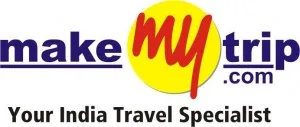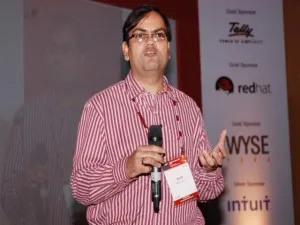In Conversation with Amit Somani, Chief Products Officer, MakeMyTrip.com
MakeMyTrip.com is one of those great startup success story from India. It went public in 2010 on NASDAQ and has stayed profitable for 8 quarters. Providing a whole host of travel based services online, MakeMyTrip is a common name in the travellers community and has achieved something enviable in the Indian online space.
A large part of this can be attributed to their highly useful software assets which are diligently managed by its product management team, headed by former

Google and IBM product manager, Amit Somani.YourStory.in caught up with Amit, and he gave us a sneak peak into the workings of the mind of a product manager and application of product management principles for success in a startup. Here is Amit Somani, Product Manager extraordinaire, and his views on product management in India, ecommerce and entrepreneurship.
[Edited Excerpts]
Why did you decided to shift to a startup after working at Google and IBM?
The decision to shift was very straightforward. I was in a global role in Google, which was very exciting; it’s a fantastic company and I'd even be happy to work there again sometime. Having said that, the opportunity at MakeMyTrip trumped Google as MMT is a pioneer in the ecommerce space in India. There was a lot happening in terms of increasing internet penetration, credit card and debit card penetration. So they had a brand laid out, but had not yet got mass appeal. So for me to come in here as head of product management, which included products, content etc., was really exciting. I hadn't worked for an “Indian” company as such and with this, I could make a change in the Indian ecosystem. I liked the founding team and the investors, etc and so I decided to make the plunge. It’s probably the early India story that excited me.
So, how is the early India story? What are some of the trends that you have noticed so far?
Things are improving all along. There are about 100 million internet users and a similar number of mobile internet users in India now. Credit card and debit card usage has also increased over the years. So there are a lot of good things happening at the macro level. In terms of ecommerce, the more Indian consumers are opening up to buying online and it almost a way of line with many now.
With any ecommerce market, travel usually leads, followed by consumer goods and then by more evolved niche categories. Another phenomenon that we are seeing now is facebook. I can't remember the exact numbers, but off the top of my head, I think facebook does something like 50 million unique visits a month now. This is a good thing because users now come to the internet for a different reason and they're spending more time there and as a result they do other things on the internet as well, which is good for us.
MakeMyTrip, fortunately is doing well. When I joined it was privately owned, and now we have spend 8 quarters being public. So at the macro level, a lot of good things are happening.
You are on the board of a couple of consumer internet companies. How many companies have you invested in?
Contrary to what you might believe, I have invested in only one company; MindTickle. Otherwise, I work with a lot of companies in terms of mentorship and other kind of support which is basically pro bono or as favours for some friends etc. You can find me working with a lot of companies at the same time but I haven't made any financial commitments as such.
In MindTickle, have you invested along with a fund or have you invested in your personal capacity?
My investment in MindTickle is in my personal capacity. An institutional fund has invested in it since then. MindTickle was one of the companies that I was mentoring in a pro-bono fashion for a while. They had reached a stage of raising money and they asked me if I was interested to invest in them, and I said “Why not?”
Apart from travel, what do you have to say about other ecommerce companies in India currently?
It’s really exciting right? You have your usual suspects like Flipkart, Snapdeal, Jabong in the large consumer space and the smaller niche players which are doing well now in terms of the selection and customer experience. They have also done some important innovations in terms of managing the supply chain

and the commodity inventory. Something like cash on delivery was almost non existent and it makes a lot of sense to have it for products. Its very good that more players are coming up in the consumer internet space. This gives people more reasons to come on the internet. Someone buying their gadgets from one place and their T-Shirts from another place have all the reasons to do other things on the internet as well.Apart from this, I wouldn't like to comment more on these areas as I'm a more of an observer in these areas rather than a practitioner.
What are the three things that define a product manager? Why is it so difficult to find a good product manager in India?
I think there are 3 major things that are essential to being a product manager. I am very passionate about product management, more than ecommerce itself. So here are the three things -
- Good understanding of the market; what is possible in the market, what are the dynamics of this market etc. Some business acumen is needed to understand this
- A good insight into customers; what is the unique insight of that customer, what is the customers problems or at least the ability to work with consumers to cull insights
- Working with engineering to deliver the product; I think most successful product managers have an engineering background or at least an appreciation for the role of engineering in delivering a product
So ideally it is the this triangle of market, customer and product expertise that make a good project manager. Of course it varies from company to company but any product manager must have these three qualities.
There isn't a good understanding of product management in India because of there aren't enough companies in India practicing product management in India. This is because most Indian IT companies are from the services sector and there isn't a need for product managers in these areas. India has very few role models for product managers and product companies in India. It is also because India comes from a services mentality.
Things are becoming different now. A few years ago, people used to question the need of a product manager. They used to think that a project manager or an engineering manager would suffice. Now we don't have such questions and people are asking where do you find these people and how do you cultivate them within an organization etc.
What are some of the gaps in the industry that you see which can be a big opportunity for entrepreneurs?
There are always opportunities out there. In terms of ecommerce, you need a lot of capital. If you have access to that, then great, if not then its going to be really difficult. But other than these, there are so many businesses to be made with the current infrastructure be it mobile or facebook or even using Google as a sole source of traffic and traction itself.
I think for an entrepreneur setting a business should be about what his passion is and what is his own background. B2C in India is very good. I haven't heard of many B2B success stories in India; not to say that they're not happening, but I don't have much insight into them. The border region between B2B and B2C is interesting. There are a lot of SaaS players in this region; they build the product here, but cater for a more western audience.
What would be your advice be for entrepreneurs who are looking to build tech companies and professionals looking to become product managers?

For building a company, the entrepreneur must be very clear about the problem that they're going to solve for what customer and understand the unique value proposition that they bring to the table to solve that problem. You have to be good at one or a few things. I often see many people target a big industry with many problems and try to solve all of them. It is very important to focus on one, two or at the most three things.Also, be very iterative in your approach. Have short and quick releases, get feedback and release another version again and do this as many times as you can. I think a lot has been said about being a lean startup and all that, but I would like to stress on the point where it is important to have short release cycles in the starting up stage.
Once you know what problem you're solving and you're iterating and you have reached a critical mass in terms of customers, you have to look at scaling. Scaling, in a B2C business depends on customer acquisition cost and customer lifetime value. The customer lifetime value should be at least three times the customer acquisition cost, because then you'll be spending more money on acquiring your customers than what they give back to you.
So there are two key milestones. One is to get to the point of scaling without scaling prematurely and the second milestone is to keep the costs under check during scaling.
Of the many benefits that India has enjoyed by foreign companies such as Google and IBM setting up offices here, are the people it has made. Amit Somani is a prime example of what world exposure can do for a person. However, the intention to give back to the ecosystem that nurtured him, is not something that everyone does. We sincerely hope this serves as inspiration for our readers and more people in Amit's position do what he did two years ago.







